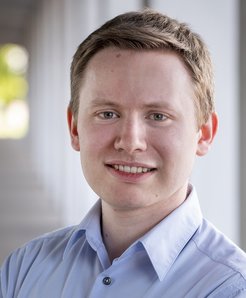Making string theory more calculable
Otto Hahn Medal for Dr. Jan Gerken
Dr. Jan Gerken is being honored with the Otto Hahn Medal of the Max Planck Society for his outstanding doctoral thesis, which he completed at the Max Planck Institute for Gravitational Physics in Potsdam. The award for his research into mathematical methods in string theory is endowed with 7,500 euros.
String theories are candidates for a unification of Einstein's general relativity and quantum field theory. If we want to understand what happens inside a black hole or in the first fractions of a second after the Big Bang, we need such a unified theory to account for both huge masses and tiny distances.
When elementary particles interact with each other, so-called scattering amplitudes can be measured in experiments. In string theory, the fundamental building blocks of nature are tiny strings of energy. These strings occur in the theory in two forms: as a closed circle (closed strings) and as a line with two endpoints (open strings). Open and closed strings can interact with each other with certain probabilities. These probabilities correspond to the scattering amplitudes, which thus connect theory and experiment. “So far, there is no experiment in sight that will allow us to observe string interactions – the energies required are just far too high,” says Jan Gerken, who is currently a postdoctoral researcher at Chalmers University of Technology in Gothenburg, Sweden. “But string theories make predictions about how the gravitational interaction is modified quantum mechanically beyond Einstein's theory of general relativity. This modification is reflected in the scattering amplitudes, which we can calculate.”
A complicated problem in string theory
The calculation of scattering amplitudes within string theory is a difficult task. For this reason, one divides the calculation into a dominant contribution and smaller and smaller corrections (subdominant terms). The result becomes more precise if one calculates more and more corrections (see Fig. 1).
In his doctoral thesis, Jan Gerken succeeded in calculating scattering amplitudes even more precisely. The software he wrote considerably simplifies the calculation of the subdominant contribution to closed scattering amplitudes. He achieved this by using new mathematical methods from the theory of modular forms.

The upper part of the figure shows the interaction of two open strings, the lower part that of two closed strings.
Another fascinating aspect about string amplitudes is that there seems to be a deep connection to number theory in mathematics. It has turned out that the dominant contribution to closed string amplitudes (Fig. 1 bottom) can be derived from the dominant contribution of open string amplitudes (Fig. 1 top) by using a mathematical tool from number theory, the so-called “single-valued map”. “During my PhD, together with my collaborators, I succeeded in taking important steps towards an extension of the single-valued map to the first correction term of the closed string scattering amplitude. This new mapping is called the elliptic single-valued map,“ Gerken explains. „One goal of further research in this area is to extend the single-valued map to even higher correction terms.“

The awardee
Dr. Jan E. Gerken (born 1991) studied physics in Karlsruhe, Dublin and Cambridge. He completed his PhD in 2020 at the Max Planck Institute for Gravitational Physics in Potsdam in Prof. Dr. Dr. h.c. Hermann Nicolai's department of Quantum Gravity and Unified Theories under the supervision of Dr. Axel Kleinschmidt. Currently, Gerken is doing research at Chalmers University of Technology in Gothenburg, Sweden.
Recognition for excellent junior scientists
The Max Planck Society has honoured up to 30 young scientists and researchers each year with the Otto Hahn Medal for outstanding scientific achievements since 1978. The award comes with a monetary sum of 7500 euros as recognition. The prize is intended to motivate especially gifted early career researchers to pursue a future university or research career. Since 1978, more than 1000 scientists and researchers have been awarded the Otto Hahn Medal. Dr. Jan Gerken received this distinction for his PhD thesis entitled “Modular graph forms and scattering amplitudes in string theory”.












